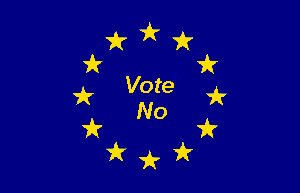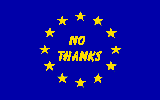

National Centre for Social Research
COUNTRYSIDE IN CRISIS
On 22nd September 2002, 407,000 people supported the 'Liberty and Livelihood' march. Many were concerned about the economic hardship faced by Britain's farmers.
Although we can thank the Countryside Alliance for drawing attention to the problem, their proposed solution - involving reform of the EU Common Agricultural Policy (CAP) misses the point. Although maybe sound on secondary points, the Countryside Alliance paper advocates "The EU must have a strong common and defensible position....".
Speaking in Paris on 29th August 2002, President Chirac rejected 'early reform of the CAP'. Under the terms of our EU membership, France can simply veto any changes and we are left with a mess that was never designed to meet our interests. A situation that has existed before we joined the EEC.
Britain's farmers should not be led down the blind alley of EU reform, but should instead call for a farming policy that meets national needs and makes us more self-sufficient in food. Economic salvation may only be found outside the EU.
A real alternative for Agriculture
www.countryside-alliance.org/policy/020906cap.pdf
- Countryside Alliance paper (PDF file)
Sovereignty web articles on Agriculture.
(See also their Countryside section via 'Journal Index' button).
A letter from Frederic Forsyth on the EU arrest warrant (Telegraph 17.12.01) said it all. If a British newspaper criticised, say, treatment of British planespotters by the Greeks, its Editor could be extradited abroad and detained for as long as the regional prosecutor or magistrate saw fit.
All that would matter is (1) that the European edition was available in Greece (2) that a suitable "crime" (e.g. 'xenophobia') existed in Greece - no equivalent need exist in the UK (3) one man's personal opinion.
Forsyth concluded "Pretending to combat terrorism, this new measure abolishes* habeas corpus [guarantee of a fast public trial], presumption of innocence, the Magna Carta and half of the Bill of Rights of 1689.
Melanie Phillips also pointed out that the list of crimes included 'corruption' 'computer crime' and 'fraud' (Mail, 15.12.01). Abroad 'fraud' can include simply making careless errors, without intent to deceive. We also note the EU definition of 'fraud' as "any offence against the financial interests of the EU" (Corpus Juris book, 1997)
"Terrorism" is a ground for extradition, but in December EU leaders agreed a catch-all definition - which might cover peaceful but spirited demonstrations. An offence covers 'intimidating' people or institutions, aimed at "seriously altering or destroying their political, economic or social structures".
However BBC Online (3/6.12.01) noted a hitch for the EU measures as Austria, Denmark, Greece, Portugal & Luxembourg all have constitutions or laws that are incompatible with them. These ban the transfer of their own nationals to any foreign jurisdiction.
The Parliamentary debate on 19.11.01 (Anti-Terrorism Crime & Security Bill) contains shocking revelations - that the Commons was being expected to nod through 114 pages of legislation, mostly unrelated to 'Terrorism' - in 2 days. David Cameron MP remarked on the EU angle: "We do not know what we shall be passing into law...".
Although inflicting several defeats on the Government's original proposals, the House of Lords misguidedly let a trimmed set through. In 2002, powers to introduce EU-wide 'terror laws' by secondary legislation [i.e. without a debate and vote in Parliament ] will be introduced in the Extradition Bill, said the Home Office (BBC Online, 7.12.01)
Civil liberties group Statewatch
have produced a detailed examination of the arrest warrant, and shown how existing safeguards are to go - including protection against being charged with separate offences, or handed over to a third country. Also immunities such as the 'double jeopardy rule' [over being tried twice].In the UK there is a separate review of criminal courts (www.criminal-courts-review.org.uk
) by Lord Justice Auld. His Report was attacked by Liberty director John Wadham as "a huge attack on the fairness in the criminal justice system - particularly trial by jury, which is its cornerstone" (Independent, 19.10.01)Recommendation 2.253 plans to admit 'hearsay' as "the best available evidence". Amazing - you could be convicted on rumour in the absence of hard evidence. (We checked if this was the practice is found on the continent - and apparently yes it is!).
Although there is no overt link to EU policy, the Government committed to Europeanising its policies in 1999. The Auld Report uses a quote from fiction to scorn traditional Trial By Jury but talks up 'professional judges' - as found in the continental model.
Lord Justice Laws in the Appeal Court has cast doubts on the legality of the 'Metric Martyrs' convictions, perhaps hinting that our legal rights have been violated? Maybe we should be putting the case - to appropriate audiences - that this attempted 'modernisation' (i.e. 'Europeanisation') is *illegal under the Queen's Coronation Oath when she promised to govern us according to our customs & laws?

